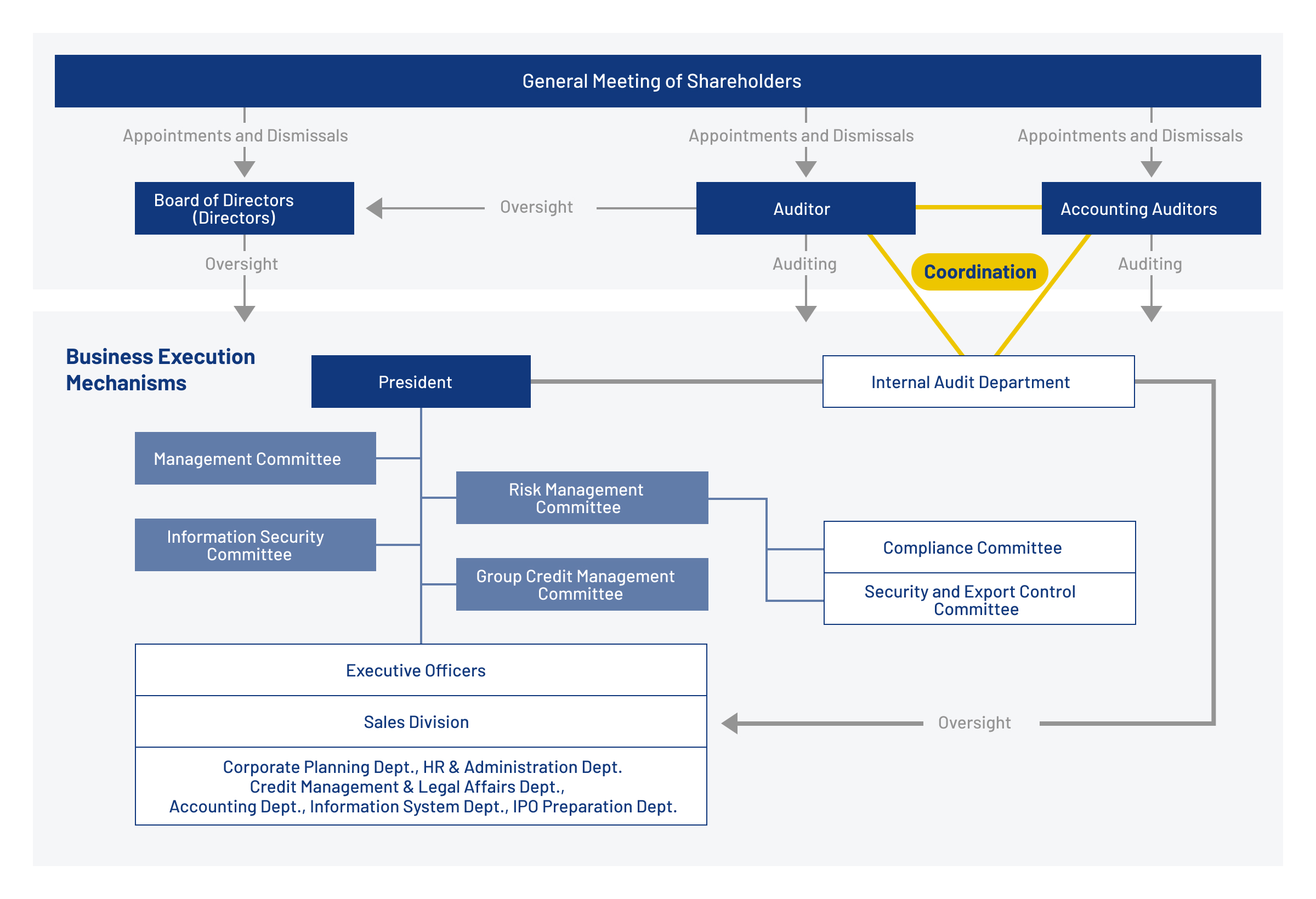Corporate Governance
Compliance Policy
Transparency and sound management increase our corporate value, and this, we believe, leads to greater shareholder trust and approval. We have strengthened our corporate governance and risk management systems, are promoting the sale of products and materials that have global environmental conservation as a goal, and are building a corporate base for sustainable growth and development.
Measures Promoting Corporate Governance
Under our executive officer system, management oversight is clearly separated from business execution. The Board of Directors is composed of directors appointed for a term of one year. It meets once a month, and makes decisions regarding important matters and consequential proposals, as set out in management policy, the Company Law, and Articles of Corporation.
The company has adopted an auditor system. Auditors attend Board of Director meetings and important internal meetings, present their opinions when applicable, audit business execution, and make proposals and recommendations.
These mechanisms are influential in raising the transparency of our operations for all stakeholders. We intend to continue strengthening corporate governance in order to be better placed as a corporation contributing to the development of economies.
Risk Management Systems
The following mechanisms are employed to oversee risk issues that could seriously impact business operations.

Management meetings are held monthly to examine significant projects and proposals from multiple perspectives, closely examining level of strategic importance, risk and its extent, outcomes, etc.
Risk management, which includes safeguarding against compliance gaps, is regarded under management policy as critical to the company’s continued existence. To further the aims of this policy, a Risk Management Committee has been established with the company president as chair. Under this committee are established a Compliance Committee and a Security and Export Control Committee. Risks pertinent to each committee are analyzed and assessed, and appropriate measures are taken. In addition, a Group Credit Management Committee headed by the company president was established. It conducts preliminary reviews of decisions made by the President and proposals made by the Board of Director regarding transactions of the company and its subsidiaries, before those decisions and proposals are implemented. In the event of an urgent situation, the required response is managed by a Crisis Response Headquarters established with the company president at its head. As soon as the crisis arises, the company will request advice from experts and take steps to accurately ascertain the crisis and take remedial action.
Fundamental Commitment to Compliance
Shoko’s Three Compliance Principles
- We are well aware that a compliance gap could threaten our corporate base, and rank full compliance as a basic management principle.
- Through full compliance, we provide products and services that answer customer expectations for safety and functionality, leading to being trusted and viewed favorably by shareholders and markets.
- We fully consider the environmental, social and economic aspects of our business activities, guided by a spirit of fairness and sincerity while contributing to efforts to make a better world, for sustainable growth and development.
Compliance Mechanisms for the Company Group
The Shoko group of companies has drawn up the following mechanisms to promote adherence to Shoko’s Three Compliance Principles. All executive officers and employees are expected to fully grasp these mechanisms and put them in practice in our daily business.

-
Line of authority regarding compliance
With authority vested first in the Board of Directors, followed by the company president and then the Compliance Committee, each of these has their respective authority and responsibility to make decisions on compliance-related matters and exert managerial control over compliance status.
-
HR & Administration Department (Compliance Committee Secretariat)
This department has overall supervisory powers over compliance, planning and promoting actual practice. It plans and implements compliance training and education programs, etc.
-
Department heads and group company presidents
As officers responsible for compliance, Shoko department heads and group company presidents strive to ensure compliance within their respective department or company, and appoint compliance promotion leaders.
-
Compliance promotion leaders
These leaders assist department heads and group company presidents in the promotion of compliance, and, as part of their function, perform the following actions.
- Organize educational programs and provide compliance guidance for employees in their department or group company
- Address and correct any compliance-related ambiguities at the department or group company level
- Respond appropriately to compliance-related reports and inquiries from department or group company employees
- Report compliance-related matters involving their department or group company to the Compliance Committee
- In accordance with instructions from their department head or group company president, implement compliance measures at their department or group company















